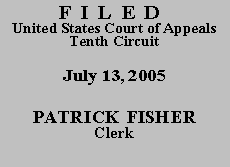

| MAX A. JACKSON,
Petitioner-Appellant, v. JOE WILLIAMS, Warden, Lea County Correctional Facility; ATTORNEY GENERAL FOR THE STATE OF NEW MEXICO, Respondents-Appellees. |
|
Petitioner-appellant Max A. Jackson appeals from the district court's order denying his petition for habeas relief filed under 28 U.S.C. § 2254. We granted a certificate of appealablility (COA) on two issues. The first issue is whether the New Mexico Court of Appeals unreasonably applied Batson v. Kentucky, 476 U.S. 79, 97-98 (1986). The court concluded that the prosecutor's reason for excusing a venireperson on the basis that he demonstrated sympathy and bias for Mr. Jackson by stating that he felt it was unfair that Mr. Jackson, who is African-American, would "be tried before a jury containing no African-American jurors" was a valid, race-neutral reason for excluding the juror. Aplt. App. at 63.
The second issue has several subparts for a claim of ineffective assistance of counsel. The first is whether the New Mexico state courts unreasonably applied Strickland v. Washington, 466 U.S. 668 (1984), in refusing to grant habeas relief for Mr. Jackson's counsel's failure to seek disqualification of the district attorney's office. The state court denied the claim because Mr. Jackson could not show prejudice, "[t]he evidence of [his] guilt [having been] overwhelming." Aplt. App. at 69. The second is whether the federal district court erred in determining that Mr. Jackson's counsel's failure to challenge the venire selection procedure was not objectively unreasonable and not prejudicial. The third is whether the federal district court erred in concluding that Jackson's counsel conducted a sufficient investigation into a key witness's credibility. And the fourth part of the issue is whether the federal district court erred in concluding that counsel was not ineffective for having made a strategic decision not to compel an interview or deposition or the disclosure of the location of a potential witness. We exercise jurisdiction under 28 U.S.C. §§ 1291 and 2253, and affirm.
Following a jury trial, Mr. Jackson was convicted in New Mexico state court of three counts of trafficking cocaine by distribution and one count of conspiracy to traffic cocaine. His convictions were affirmed on direct appeal and his subsequent state petitions for post-conviction relief were denied. Mr. Jackson brought a habeas petition in federal district court, asserting the same issues set forth above. The New Mexico courts had addressed the merits of only the Batson issue and the ineffective-assistance-of-counsel claim related to counsel's failure to seek disqualification of the district attorney's office. The state courts denied relief on the other three ineffective-assistance-of-counsel claims without discussion. The magistrate judge to whom the federal habeas petition was assigned prepared a thorough, eighteen-page report fully analyzing all claims, which the district court adopted in denying the petition for habeas corpus.
Because this habeas petition was filed after the effective date of the Antiterrorism and Effective Death Penalty Act (AEDPA), Pub. L. No. 104-132, 110 Stat. 1214 (1996), it is governed by AEDPA's provisions. See Mitchell v. Gibson, 262 F.3d 1036, 1045 (10th Cir. 2001).
When reviewing the denial of a habeas corpus petition, we are generally subject to two different frameworks of review, depending upon whether the state courts addressed the merits of the claim for relief. If the state courts have not heard the claim on its merits, we review the district court's legal conclusions de novo and its factual findings, if any, for clear error. If the state courts have addressed the claim on its merits, we review the state court ruling under the standard enunciated under 28 U.S.C. § 2254.
Id. (quoting Hale v. Gibson, 227 F.3d 1298, 1309 (10th Cir. 2000)).
After AEDPA, a federal court may not grant habeas relief on a claim
adjudicated on the merits in state court unless the state court decision
"was contrary to, or involved an unreasonable application of, clearly
established Federal law, as determined by the Supreme Court," 28
U.S.C. § 2254(d)(1), or "was based on an unreasonable determination
of the facts in light of the evidence presented in the State court
proceeding," id. § 2254(d)(2). State court fact findings are presumed
correct unless the petitioner rebuts them by clear and convincing
evidence. A state court decision is contrary to clearly established
federal law under section 2254(d)(1) if the state court arrives at a
conclusion opposite to that reached by the Supreme Court on a
question of law or if the state court decides a case differently than
the Supreme Court has on a set of materially indistinguishable facts.
A state court decision is an unreasonable application of federal law
under section 2254(d)(2) if the state court identifies the correct
governing legal principle from the Supreme Court's decisions but
unreasonably applies that principle to the facts of the prisoner's case.
The reasonableness of the state court's application of federal law is
to be evaluated by an objective standard. The Supreme Court has
cautioned that an unreasonable application of federal law is different
from an incorrect or erroneous application of federal law.
Id. (quotation marks, citations, and brackets omitted).
Applying these standards, we have carefully reviewed the record, the
parties' arguments, and the applicable law in this case. For substantially the same
reasons stated in the magistrate judge's amended report and recommendations
filed June 15, 2004, we conclude that the habeas petition was properly denied.
The judgment of the district court is AFFIRMED.
Entered for the Court
Circuit Judge
*. This order and judgment is not binding precedent, except under the doctrines of law of the case, res judicata, and collateral estoppel. The court generally disfavors the citation of orders and judgments; nevertheless, an order and judgment may be cited under the terms and conditions of 10th Cir. R. 36.3.